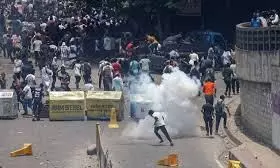
Internet suspended in Bangladesh as protests escalate, over 100 dead
text_fieldsBangladesh has been effectively cut off from the rest of the world as internet and text message services have been suspended since Thursday.
The blackout comes amid escalating protests against government job quotas, resulting in at least 110 deaths and thousands of injuries.
On Saturday, soldiers patrolled the empty streets of Dhaka, setting up roadblocks and enforcing a curfew aimed at quelling the student-led demonstrations.
The protests, which have continued despite a ban on public gatherings, have led to widespread clashes between demonstrators and security forces. Police have used tear gas and sound grenades to disperse crowds, while protesters have retaliated by throwing bricks and setting vehicles on fire.
John Heidemann, chief scientist of the networking and cybersecurity division at USC Viterbi's Information Sciences Institute, compared the internet shutdown to the drastic measures seen during the Egyptian revolution of 2011. The suspension has left Bangladesh's nearly 170 million people largely disconnected from the outside world, with overseas calls failing to connect and local media websites and social media handles inactive, reported Reuters.
The death toll has continued to rise, with the Dhaka Medical College Hospital receiving 27 bodies within a two-hour window on Friday. The unrest, the largest since Prime Minister Sheikh Hasina's re-election for a fourth consecutive term, is fueled by high unemployment among young people, who constitute nearly 20% of the population.
In response to the escalating violence and the inability of police and security forces to control the situation, Hasina's government imposed a national curfew and deployed the military. The curfew was briefly eased on Saturday to allow residents to purchase supplies, but it will remain in effect until Sunday morning when the government will reassess the situation.
Television footage showed army personnel inspecting identification cards at checkpoints and setting up roadblocks and bunkers across strategic locations in Dhaka, the epicenter of the anti-quota protests.
The nationwide unrest was sparked by student anger over controversial quotas for government jobs, including 30% reserved for families of those who fought for independence from Pakistan.
Although Hasina's government abolished the quota system in 2018, a court reinstated it last month. The state has appealed the reinstatement, and the Supreme Court has suspended it pending a hearing on August 7.
In Narsingdi, a district in central Dhaka, protesters stormed a jail on Friday, freeing over 850 inmates and setting the facility on fire. Scattered incidents of arson were also reported in other parts of the country on Saturday.
Prime Minister Hasina has canceled planned diplomatic visits to Spain and Brazil due to the unrest. Meanwhile, many opposition leaders, activists, and student protesters have been arrested. Tarique Rahman, the exiled acting chairman of the main opposition Bangladesh Nationalist Party, reported numerous arrests, including that of Nahid Islam, a leading coordinator of the student protests.
1,000 Indian students have returned home since the violence began. International rights groups have condemned the internet suspension and the actions of security forces, while the European Union has expressed deep concern over the violence and loss of life.























